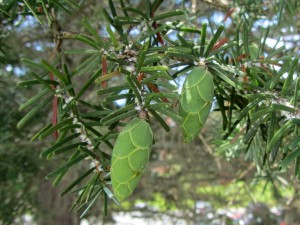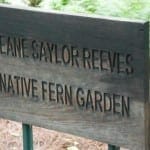Special Project Awards
The mission of the Georgia Native Plant Society is “To promote the stewardship and conservation of Georgia’s native plants and their habitats through education and with the involvement of individuals and organizations.” In support of that mission, the GNPS has donated money to projects and individuals for many years. Donations to individuals are in the form of symposium/conference scholarships. Donations to projects include grants for research and money to help fund the publication of books and other educational materials about native plants.

GNPS made a donation in 2008 to help fund the purchase of this land in northwest GeorgiaDuring the year, the Finance Committee determines if GNPS has excess funds available to award to other organizations that share and support GNPS mission. The Board of Directors decides which organizations will receive these gifts as well as the amount awarded to each organization.
During the year, the Finance Committee determines if GNPS has excess funds available to award to other organizations that share and support GNPS mission. The Board of Directors decides which organizations will receive these gifts as well as the amount awarded to each organization.
Previous awards include:
In 2015, The Board of Directors awarded a $5000 donation toward the Hometown Habitat video project. Hometown Habitat is a 90-minute environmental, education documentary focused on showing how and why native plants are critical to the survival and vitality of local ecosystems. Entomologist Doug Tallamy, whose research, books and lectures, sound the alarm about habitat and species loss provides the narrative thread throughout Hometown Habitat. The message: “We can change the notion that humans are here and nature is some place else. It doesn’t have to, and shouldn’t be that way.” Each individual has the power to conserve resources, restore habitat for wildlife and bring beauty to their patch of earth.
In 2012, The Board of Directors awarded four very diverse gifts to deserving organizations for a total of $30,372. We believe that all of these projects will help to support the mission of GNPS.
Georgia DNR Heritage Program
The Georgia Department of Natural Resources (DNR) Heritage Program is a part of the Nongame Conservation Section of the DNR Wildlife Resources Division which includes all animals and plants. The Heritage Program is a small organization and the field botanist staff number only three: Lisa Kruse, Mincy Moffett, and Tom Patrick. You may recognize Tom Patrick’s name as he has been involved with a number of our programs in the past.
The GNPS gift will establish a “Recovery Actions for Rare Plants” account as a special purpose funding source within the overall Nongame Conservation Fund with the express and exclusive directive to support plant conservation efforts for Georgia’s rare, threatened or endangered plants. Some initial uses of this special purpose fund would include activities such as: field surveys for rare plants, landowner contact to set up management agreements, monitoring of endangered species, technical assistance in the preparation of conservation easements or other conservation plans, and support of management activities to enhance rare plant habitat.
GNPS members are encouraged to consider a personal gift to the DNR (earmarked to this special fund) to help enhance the Society’s support. Total funding: $15,000.
SBG Center for Native Plant Studies
During the past year, the State Botanical Garden of Georgia (SBG) significantly expanded its conservation program by opening the Center for Native Plant Studies. The Center occupies a seven-acre site on the SBG grounds, adjacent to a floodplain forest that is being actively restored to enhance plant and wildlife diversity. The Center is the headquarters for their native plant research and propagation activities as well as endangered plant safeguarding. In the future it will also include native plant display gardens for public visitors.
In 2010, SBG launched a new program called the Georgia Native Plant Initiative. Its goal is to build a partnership between commercial growers, horticultural scientists, land managers, restoration ecologists, and plant societies to promote the ethical, sustainable, and creative use of native plants in Georgia. As part of this effort, SBG is developing expertise in collecting and propagating regional native plant material for roadsides, power line right-of-ways, restoration, and home use.
The Board was pleased to be able to support new efforts to bring native plants into the nursery trade for projects large and small. A gift from GNPS will be used to provide funding to build raised beds, convert a hoop house, and support a fall internship. Total funding: $8,617.
- New hoop house
- Picture courtesy of SBG
Abraham Baldwin Agriculture College (ABAC) — Mill’s Bog
Coastal plain bogs are threatened because of loss of habitat. These wetland plant communities are attacked by construction, erosion, changes in hydrology, suppression of fire and pollution causing them to be destroyed or degraded.
Abraham Baldwin Agriculture College (ABAC) in Tifton has the opportunity to acquire some property that includes a coastal plains bog. Although a small tract, the bog site contains an intact flatwoods and longleaf pine uplands. The uplands support typical wiregrass associates and gopher tortoises. The flatwoods buffer a small stream bordered by Ogeechee lime and remnant slash pine. With continued prescribed burning, the entire site will remain a coastal plain botanical showpiece. The Mill’s Bog property is currently for sale for $38k but only $5k remains needed to purchase it.
ABAC will assume ownership and provide custodial duties. The intent is that Mill’s Bog will become a vital living educational resource in ABAC’s Forestry and Wildlife/Natural Resources Department to provide student education in both plant id and habitat maintenance. This will become an excellent venue for educating those who will provide the stewardship of native plant habitats in the future. Total funding: $5,000.
Partnership with Georgia Piedmont Land Trust
The Board is pleased to partner with the Georgia Piedmont Land Trust (GPLT) to help broaden the educational reach of the Society to a new community of people.
GPLT created several information inserts for their newsletter that provide detailed information on both native plants and invasive plants. This information is geared towards educating their members on the beauty and usefulness of specific native plants as well as highlighting some common non-native invasive plants. These informational inserts were designed to be reprinted as needed in the years ahead as ageless handouts whenever GPLT has outreach events such as with various Rotary groups, Civitan clubs and local conservation, birding and garden groups. In addition, GNPS has these documents on our website as reference materials. Total funding: $1,755.
In 2010, The Board of Directors decided that a total of $12,400 could be awarded. After considering two proposals, the board voted to contribute equal gifts of $6,200 to both the Georgia Natural Heritage Program and the predator beetle rearing lab at North Georgia College and State University (NGCSU).
Georgia Natural Heritage Program
The Board of Directors voted to award the Georgia Department of Natural Wildlife Resources Division (WRD) Nongame Conservation (NCS) Natural Heritage Program (GNHP) in recognition of this program’s outstanding work in conserving Georgia’s rare native plants and education on natural environments and habitats. The Natural Heritage Program has a broad conservation impact across the state.
The awarded funds will be put to the best possible use in the areas of most need for the Natural Heritage Program whether that be in conserving Georgia’s natural habitats, conducting rare plants surveys, supporting GNHP’s education program, or performing other critical work. The Georgia Native Plant Society frequently works with Tom Patrick who has donated his time and talent as a speaker and educator to GNPS on numerous occasions.
DNR/Wildlife Resources Division/Nongame Conservation Section receives no state appropriations. It depends on grants, fundraising, and donations to conserve Georgia’s rare native plants, natural habitats, and nongame wildlife. Other primary fundraising sources are the nongame wildlife license plates, the ‘Give Wildlife a Chance’ state income tax check-off and Weekend for Wildlife.
GNPS recognizes the Georgia Natural Heritage Program’s responsibility for protecting endangered and threatened plants in Georgia; as a first line of defense in protecting and conserving Georgia’s native plants, and restoring endangered habitats; for their development of protocols to restore endangered habitats; and land acquisition for conservation, partnering with other conservancy organizations.
Predator Beetle Rearing Lab
The Board of Directors also voted to award the NGCSU predator beetle lab for their program of research and frontline defense against the hemlock wooly adelgid (Adelges tsugae), an invasive aphid-like insect that is devastating Eastern and Carolina hemlocks.
The NGCSU lab, established in 2007, mass rears and releases USDA approved predator beetles that feed exclusively on the hemlock wooly adelgid pest. The Sasajiscymnus tsugae beetle has been reared for several years, and in 2010 the lab added another predator –- Scymnus sinuanodulus. This species will be added to releases in 2011.
The aim of the NGCSU lab is to release beetles into threatened hemlock forests and evaluate the success of these releases. Their work is in cooperation with other academic institutions in the region that are rearing a variety of predators to guarantee a year round fight against the adelgid.
In addition to establishing predator beetle populations to help prevent the wooly adelgid damage to the hemlock trees, the lab conducts research into the unique environmental conditions in Georgia that promote trends that vary from those seen north of here. The gift from GNPS will be used for lab equipment and outdoor measuring units, and to fund travel to research sites.
In 2008, The Board of Directors decided that a total of $25,000 could be awarded. It was decided, after careful consideration of several opportunities, to fund the two organizations listed below. Both opportunities fund not just land conservation, but also habitat conservation for some unique native plant communities.
The Nature Conservancy’ Black’s Bluff Preserve in Floyd County – $20,000
Wolf Creek Preservation in Grady County – $5,000
In 2007, The Board of Directors decided that $5,000 would be awarded to Georgia Perimeter College Native Plant Botanical Garden for a garden dedicated to Jeane Reeves.
- Jeane Saylor Reeves
- A native fern garden was dedicated to Jeane Saylor Reeves.





